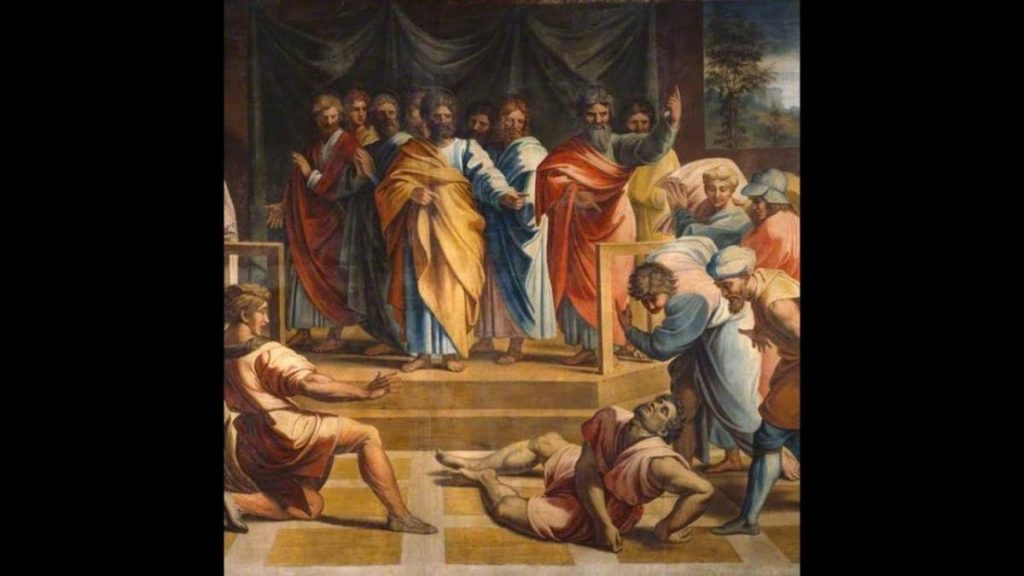| Acts 5 During the course of thirty-six years of priesthood I’ve heard a hundred versions of: “We talk too much about money in Church; my pledge is my business; just cut the budget.” This pleasant little vignette in Acts 5 regarding Ananias and Sapphira reminds us, on the off chance we missed the teaching of Jesus on the matter, that money is very much at the core of spiritual commitment. The whiff of communalism found in Acts 2, where all held everything in common, has dissipated and here a robust affirmation of individual agency is asserted. Before Ananias and Sapphira sold their land, it was fully theirs, as were the proceeds of the sale of their land. The problematic issue is that Ananias and Sapphira pretend that they have sold this land and have given all of the proceeds to the nascent Church community. This seems a bit of a quibble to me, and certainly not a matter for which two relatively faithful and well-intentioned parishioners ought be struck dead and carried out to the cemetery. Rather harsh? If I had been Peter, I would have cried myself to sleep that night. The obvious point is that, in misrepresenting themselves to the Church, Ananias and Sapphira have misrepresented themselves to God, and, perhaps an equally weighty matter, they have engaged in self-deceit. They have lied to themselves about themselves and their own motives, and regarding a spiritual commitment which they have not made, though they have so pretended. Come to think of it, to live as such a person might be worse than being struck dead. Christians are under severe obligation to steward their possessions for the furtherance of the Gospel. It is the business of the Church, not to direct anyone’s personal finances, but to remind all who claim a life-changing commitment to God in Christ to flee from self-deceit, and to take seriously the teachings of our Lord. None the less, my fondness for Peter is diminished by this incident. Though Peter and the rest of the disciples are certainly exercising their own spiritual commitment to a remarkable degree. They continue to proclaim the Gospel under threat from displeased authorities at great peril, receiving thirty-nine brutal, life-threatening lashes as they are left, relatively, off the hook. I guess that offers perspective. There are all sorts of personalities scatter-shot through this chapter. Gamaliel, a mediating presence in Congress, is thought by many scholars to have been St. Paul’s mentor. In lawyerly fashion Gamaliel argues effectively that if the preaching of these apostles is not of God, it will falter, and if it is of God, then their message will prevail. History demonstrates that the Message has indeed, managed a bit of increase. Roman Catholics, Orthodox Christians and Anglicans make up the majority of the practicing Christians on the earth. This ought lead, not to triumphalism, but solidarity. In Sri Lanka, Easter attacks on Christian celebrations saw many lost. On the final day of Passover, a Jewish synagogue in Poway, California was assaulted. Ramadan is unfolding. Between all Faith Groups, intentional resistance against those motivated by overmuch dogma, prejudice or partisanship, religious and political, ought prevail. This spirit would coincide, I think, with the Spirit of Christ, who desired a safe sheep-fold for all, as uniformity is impossible, thanks be to God. The cause of Christ still has a long way to go. Speed that cause forward without self-deceit, and with full conviction. Grace and peace, Canon George F. Woodward III For the Right Use of God’s Gifts “Almighty God, whose loving hand hath given us all that we possess; Grant us grace that we may honor thee with our substance, and, remembering the account which we must one day give, be faithful stewards of thy bounty, through Jesus Christ our Lord. Amen.” BCP page 822 |

| St. Paul’s Anglican Church Calzada del Cardo, 6 Centro 37700, San Miguel de Allende, Mexico 415.121.3424 www.StPaulSMA.com |

